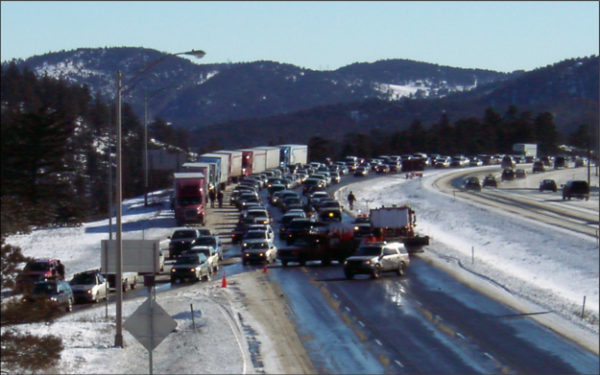Effort to increase Colorado transportation, education funding moves forward

Summit County lawmaker Julie McCluskie and Colorado Speaker of the House KC Becker on Monday celebrated a committee victory for their bipartisan bills they say will allow the state to “better fund public schools, higher education and transportation.” The bills would ask voters to let the state spend excess tax revenues above the TABOR cap equally on those three things.
“Leaders in business; health care; K-12 and higher education; transportation; and rural, urban and suburban Colorado talked about the value of the bipartisan measures we’re putting forward,” Rep. McCluskie, D-Dillon, said in a release, referring to the bills’ initial approval in the House Finance Committee.
“This is not going to solve our state’s funding crisis, but these are one-time use dollars that can have a real impact. It’s common-sense, it’s smart, and it’s about doing what’s right,”she added. Becker echoed those sentiments.
“The state budget should be able to grow with the economy so we can make important, investments in our future. It makes sense to ask voters whether the state can keep the money it already receives when times are good and that’s what we’re proposing,”said Becker, D-Boulder.
“The TABOR cap is an antiquated fiscal policy that has severely limited Colorado’s ability to invest in basic functions of government. This is not an answer to all of Colorado’s fiscal problems, but it’s a strong first step in making sure our fiscal policy supports our way of life,” Becker added, referring to the 1992 passage of the Taxpayer Bill of Rights.
The combination of TABOR and Colorado’s unwillingness to raise its gas tax since 1991 is blamed for the state’s 12th-lowest level of road funding nationally and a $9 billion budgeting shortfall for the Colorado Department of Transportation’s list of needed road and bridge repairs and upgrades.
Here’s a version of a story on transportation funding for Interstate 70, produced by RealVail.com, that first appeared in the Vail Daily on March 26:
When transportation lobbyist Sandra Hagen Solin was a girl growing up in Vail, she remembers driving home with her family after a weekend in the city and seeing bump-to-bumper traffic crawling back down to Denver on Interstate 70. She thought there’d been a disaster and people were fleeing the mountains.

Sandra Hagen Solin
Turns out there was no immediate catastrophe – just the slow-motion strangulation of Colorado’s key east-west corridor between its major metropolitan areas along the Front Range and the mountain resort playgrounds that make the state a world-famous tourist destination. All these years later, the actual disaster of a booming population and dwindling highway budget continues.
According to the Colorado Department of Transportation, Colorado’s population has increased 53 percent since 1990 but the lane miles on the state’s highway system have increased just 2 percent due to crippling budget constraints. CDOT has a $9 billion backlog of improvements.
A Denver Metro Chamber of Commerce study found that I-70 congestion costs $839 million in 2005 dollars every year in lost time, productivity, tourism and local and state tax revenues. About 70 percent of CDOT’s annual $1.4 billion transportation budget goes to maintenance, and Colorado’s 22-cent gas tax – the 12th lowest in the nation – has not been increased since 1991.
“We have long been promoting Colorado on its quality of life, and we will quickly lose that argument if we don’t invest in our ability to move, to get to the places we love and get to the places that provide us income,” said Solin, spokeswoman for Fix Colorado Roads. “And if we don’t address something soon, it gets increasingly difficult and just gets worse and worse.”
Colorado voters in November decisively turned down both a sales tax increase (Proposition 110) that would have funded a $6 billion CDOT bond issue and Proposition 109 that would have authorized a $3.5 billion bond sale. Now state lawmakers have introduced legislation to let Colorado voters once again have a crack at carving out some extra funding for roads.
HB 1257 refers a measure to the November 2019 ballot asking voters to let the state retain and spend state revenues in excess of the Taxpayer Bill of Rights (TABOR) cap, the constitutional limitation on state spending. HB 1258, contingent on voters approving HB 1257, would split that revenue up one third each on public schools, higher education, and roads, bridges and transit.
Just how much money would wind up being spent on I-70 and other road projects is subject to debate, but most experts agree that even if the legislature approves the measures for the ballot and voters then give the state the OK to “de-Bruce” (TABOR was spearheaded by anti-tax crusader Douglas Bruce), new revenue will still be needed to fix the state’s failing roads.
The Joint Budget Committee last week completed negotiations on the budget and approved the “Long Bill” package for introduction to the state senate this week. It contains a proposed $230 million in general fund spending on transportation, but business interests would like to see a lot more for roads.
“It’s an economic development issue,” said Colorado Ski Country USA President and CEO Melanie Mills. “We are hustling to bring all these great companies and employers to live in our state because we have this great quality of life for their employees, but, gee, hop in your car on Friday evening after work and get ready to sit. It’s a problem.”
Mills, whose lobbying group represents the majority of the state’s ski areas, says the state must increase overall spending and find new revenue streams. Neighboring Utah has 2.4 million fewer residents but nearly the same annual transportation budget, and it collects nearly 30 cents a gallon in gas taxes while also tapping into state sales taxes revenues to fund transportation.
“We’re not just saying that the general fund is the only place that we should be identifying money for our transportation needs. We think we need new money, too,” Mills said. “But it’s really inexcusable to us that it seems to be such a low priority for the legislature.”
State Sen. Bob Rankin, a Carbondale Republican, thinks a gas-tax increase is what’s needed as a long-term funding solution, even though it continues to poll poorly in tax-adverse Colorado. In the meantime, the Joint Budget Committee member is also dismayed there has not been more emphasis on transportation funding this session.
“Everybody has their priority system, and I guess campaign promises come first, and kindergarten is $220 million,” Rankin said before Democratic Gov. Jared Polis settled on $185 million from the JBC for that policy priority. “That could make a difference for transportation, but that’s not where we’re being asked to do this year.”
Solin, who works for the Northern Colorado Legislative Alliance — the public policy arm of the Fort Collins, Loveland and Greeley chambers of commerce – is focused on expanding Interstate 25 north of Denver. But she also works closely with the Vail Valley Partnership on I-70. Her groups sees a gas-tax increase with an index as the most viable option with voters.
Mills’ organization would also be open to exploring a gas tax increase on the ballot, but she says that the costly and arduous 17-year process that led to 2011’s I-70 Record of Decision identified some sort of advanced guideway mass transit system as a preferred alternative for the corridor and recommended that a funding source should be secured by 2020.
Because that hasn’t happened, she thinks it’s time to start talking about reversible bus lanes on peak weekend skier traffic days and possibly restricting truck traffic. Greg Fulton, president of the Colorado Motor Carriers Association trucking lobby, says less than 2 percent of the traffic during peak skier periods is commercial trucking and that his industry needs to deliver goods.
“What people tend to forget about I-70 and what we have to always remind folks is it’s an interstate corridor,” Fulton said. “It serves so much more [than skiers] and it’s not like a local road. It is an interstate, and it is critical to the economic welfare of the state, and even the country in many ways.”
Fulton’s lobbying group also strongly supports raising the gas tax.
CDOT, meanwhile, has a wish list of big-ticket projects it would like to start working on along I-70, including another climbing lane on the west side of Vail Pass. Also on the list, a westbound toll lane from Idaho Springs nearly to the Eisenhower Tunnel, expanding the popular Bustang bus service, fixing the Silverthorne interchange, and a $500 million project to replace the aging bridge at the bottom of Floyd Hill where Kermit’s used to be, including tunneling under and straightening the interstate where it’s too curvy for such steep descents and ascents.
But such projects will have to wait until long-term funding sources are secured. A spokeswoman would not weigh in on what type of funding the state should pursue.
“It’s fair to say that additional funds for transportation would be put to very productive use and to real projects that would make a difference in the corridor,” CDOT spokeswoman Amy Ford said.


Latest posts by David O. Williams (see all)
- Democratization or ruination? A deep dive on impacts of multi-resort ski passes on ski towns - February 5, 2025
- Western Rail Coalition looks to revive passenger rail service on long-dormant line connecting Colorado mountain towns - January 22, 2025
- Colorado ski town looks to dig deep, diversify energy sources as climate change threat looms - January 10, 2025

You must be logged in to post a comment Login